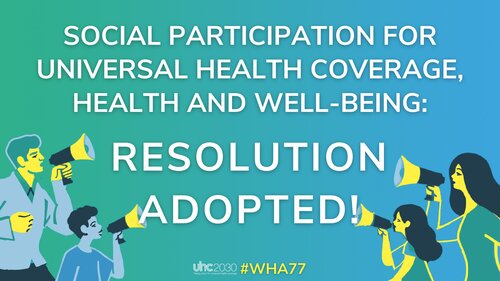Global health leaders and stakeholders gathered in Berlin last...
30 May 2024
A statement from UHC2030 co-chairs following the adoption of the resolution on social participation at the Seventy-seventh World Health Assembly

On the quest for health for all, all for health, we must embrace a whole-of-society approach and promote multi-stakeholder cooperation. That is why we the co-chairs of UHC2030 congratulate WHO Member States for their adoption of the resolution on social participation for universal health coverage, health and well-being and offer our unwavering support for its implementation.
Social participation is critical to ensure people-centered health services and build equitable and resilient health systems that respond to the needs of people and communities, particularly those in vulnerable and marginalized situations. It is the key to closing the gaps in access to services and addressing the daily struggle of billions of people around the world who are denied the fundamental right to health, well-being and dignity.
More inclusive governance for health also provides the basis for creating trust in public health policies and programmes, which is indispensable for better outcomes during times of crisis and calm.
Although governments have the primary responsibility to ensure people’s health, they alone cannot deliver health for all. This resolution recognizes the importance of regular and meaningful social participation to ensure the accountability and legitimacy of health systems strengthening and universal health coverage efforts anchored in a primary health care approach. In adopting it, Member States have committed to:
- Strengthening public sector capacities for the design and implementation of meaningful social participation;
- Enabling equitable, diverse and inclusive participation, with a particular focus on promoting the voices of those in vulnerable and/or marginalized situations;
- Ensuring that social participation influences transparent decision-making for health across the policy cycle, at all levels of the system;
- Implementing and sustaining regular and transparent social participation using a range of mechanisms supported by public policy and legislation;
- Allocating adequate and sustainable public sector resources in support of effective social participation;
- Facilitating capacity strengthening for civil society to enable diverse, equitable, transparent and inclusive social participation; and
- Supporting related research, and piloting projects/programmes and their monitoring and evaluation to promote the implementation of social participation.
UHC2030 welcomes this key step towards inclusive, responsive and effective health systems governance. However, we also recognize that a resolution alone is not enough to make inclusive health governance become a reality. What matters now is how we take the resolution forward. This requires political will and leadership to translate the resolution into country action with clear strategies, milestones and timelines.
We the co-chairs of UHC2030 stand ready to work will all partners to scale up efforts towards institutionalizing social participation for meaningful and effective engagement in decision-making processes for UHC. We will also review progress and promote the exchange of experience and lessons learned in close collaboration with all partners, and particularly those who are elevating the voices of communities, people, patients and health and care workers.
Let’s all use the resolution on social participation for universal health coverage, health and well-being – and the political momentum stemming from its adoption – to push for immediate action and accountability, so that everyone's voice is heard and we can truly ensure “nothing about us, without us”.
